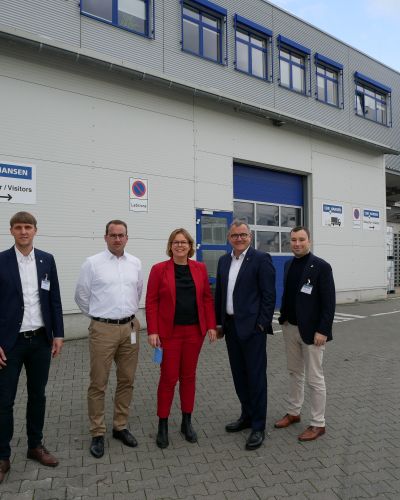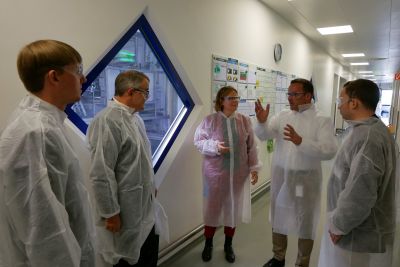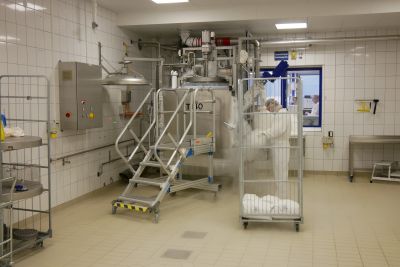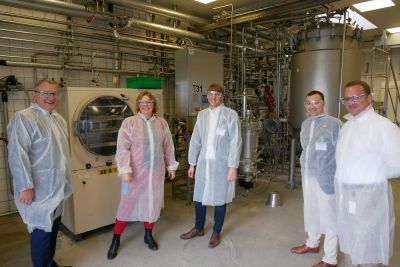Biotech company Chr. Hansen develops and produces bacterial strains in Pohlheim, Hessen, providing a sustainable way to make food last longer and thereby reduce food waste. Thanks to the ideal local conditions, the site was recently expanded – and production was more than doubled.

Microorganisms from central Hessen – for 150 million people every day from the most sustainable company in the world
Pohlheim is a small town of around 18,000 inhabitants in Hessen in the middle of Germany. The lively university town of Giessen is only a few minutes away and the logistic hub of Frankfurt airport can be reached in just 45 minutes. So it’s no wonder that tranquil Pohlheim in central Hessen has become a sought-after business location – and has gained a global hidden champion in the Danish company Chr. Hansen: Every day, more than 150 million people around the world consume food that has been produced with microorganism cultures from Pohlheim.
“We are a diversified biotechnology company that develops natural ingredient solutions for the food, nutritional, pharmaceutical, and agricultural industries. Pohlheim is our global innovation and production center and the largest and most modern production facility in the world in which we produce cultures for processed foods”, explains site manager Charlotte Lorentzen. Together with Michael Erkes, Sales Manager Europe, Charlotte Lorentzen guided Hessen business promoters through her plant: Visitors Dr. Rainer Waldschmidt and Jonas Winkler of Hessen Trade & Invest GmbH (HTAI), and Christian Piterek from Regionalmanagement Mittelhessen learnt about the innovative developments in Pohlheim.
40,000 microbial strains on offer
Chr. Hansen is a pioneer in the development of natural ‘good bacteria’ that can be used in a targeted way to make food safer, tastier, and longer lasting. Because this means that pesticides, antibiotics, and artificial additives, as well as food waste, can be significantly reduced, the process contributes to sustainability on several levels. “This is an excellent example of the great ways in which biological solutions can protect the environment while also offering benefits for consumers and the economy”, explains HTAI CEO Waldschmidt.
With the innovative approach of Chr. Hansen, bacteria are first obtained in pure cultures from food and other natural sources. The Danish company has around 40,000 microbial strains in total. Using highly complex processes based on more than 145 years of experience, Chr. Hansen supplies each strain with an individually optimized nutrient mixture and feeds it into the fermentation process.
In this well-known process, ‘good bacteria’ crowd out other microorganisms that can spoil the food or – as with the dreaded listeria – can lead to food-borne infections. Products that traditionally use this process are known all over the world: They include sauerkraut, kimchi, and miso, as well as cheese, yoghurt, beer, and wine. Thanks to its innovative processes, Chr. Hansen can use this method in a standardized and controlled way in many other areas – and with maximum efficiency: Each small bag of bacteria that leaves the Pohlheim plant is enough for up to several tons of foodstuffs.
“These are numerous innovative approaches that extend far beyond the region and make Pohlheim a globally important location for Chr. Hansen. Together with the Hessen Economic Development Network, we support sustainable investments in Hessen such as these and are delighted to accompany international companies on their interesting journeys to solving global nutritional issues.”
Accelerated loading at Frankfurt Airport
“We cool the bacterial strains down to -196 degrees Celsius to prepare them for transport to our customers around the world. Depending on the process, they are then stored at -18 to -55 degrees Celsius. That’s why we need very special premises – and the ability to ship our products internationally quickly and efficiently”, explains Sales Manager Michael Erkes. “Thanks to our close cooperation with the local authorities, we can complete some of the security formalities in our factory so that we can load faster at Frankfurt Airport. Here, our location in the middle of Hessen pays off enormously for us.”
Another advantage of the region around Pohlheim: With the Technische Hochschule Mittelhessen (THM) University of Applied Sciences, the Justus Liebig University in Giessen, and the Philipps University of Marburg, we have three excellent universities with a scientific and technical focus very close by. “This is a great opportunity for us to find highly qualified student trainees and future employees. As the loyalty of employees in Germany is generally higher than, for example, in my Danish homeland, companies can make very valuable investments for the future here”, emphasizes Site Manager Charlotte Lorentzen.
Christian Piterek from Regionalmanagement Mittelhessen is very encouraged by such positive feedback. “As a regionaleconomic development organization, we provide targeted support to companies around education, skilled workers, innovation, and infrastructure. Through networks between business and academia, we can foster collaborative partnerships – and Chr. Hansen provides a wonderful example of how this kind of cooperation pays off for both sides”, says Piterek.
"Over the years, the number of our employees has increased from 50 to 110 as our strong growth has made investment necessary in various areas. And we still have work to do here: We want to increase our packaging capacities in the near future."
12 million euros invested in the central Hessen location
Because of these optimal site conditions, Chr. Hansen once again expanded its existing plant in central Hessen in 2021 and invested more than 12 million euros, which more than doubled production in Pohlheim. “Over the years, the number of our employees has increased from 50 to 110 as our strong growth has made investment necessary in various areas. And we still have work to do here: We want to increase our packaging capacities in the near future”, says Charlotte Lorentzen.
A new test laboratory is already in operation, where the biotech experts are now developing individually tailored products together with their clients. A specially secured area also houses extensive laboratories for company-wide quality control. Here, highly qualified staff analyze the activity of the bacterial strains using state-of-the-art methods such as PCR testing. “For example, we can simulate how the end products behave when refrigerated in a supermarket and thus ensure that our bacterial strains always guarantee optimal freshness and longevity. This ensures significantly lower losses for retailers and consumers. And that is a very important building block when it comes to sustainability, because a large proportion of food waste is due to the expiry date of the products”, explains Michael Erkes.
"This demonstrates impressively that sustainability-oriented business models lead to long-term economic success – and our region offers the ideal conditions for companies to grow sustainably."
Recognized as the most sustainable company in the world
Sustainability is fundamentally embedded at Chr. Hansen: More than 80 percent of current sales make a direct contribution to the three global UN sustainability goals of Zero Hunger, Good Health and Wellbeing and Responsible Production and Consumption. In fact, Chr. Hansen was named the most sustainable company in the world by business magazine Corporate Knights at the World Economic Forum in Davos in 2019. "This demonstrates impressively that sustainability-oriented business models lead to long-term economic success – and our region offers the ideal conditions for companies to grow sustainably, outlines HTAI´s Director for Location Marketing & Investor Services Jonas Winkler.
But the company is also working to forge new sustainable pathways in production. The site in Pohlheim uses 100 percent green electricity from the region. Chr. Hansen is currently also working on a process for producing biogas from its production residues in a nearby biogas plant.
“These are numerous innovative approaches that extend far beyond the region and make Pohlheim a globally important location for Chr. Hansen. Together with the Hessen Economic Development Network, we support sustainable investments in Hessen such as these and are delighted to accompany international companies on their interesting journeys to solving global nutritional issues”, says Rainer Waldschmidt.
Chr. Hansen
Chr. Hansen Holding A/S, headquartered in Hoersholm, Denmark, is a diversified biotechnology company that has specialized in natural ingredients for the food, nutritional, pharmaceutical, and agricultural industries for over 145 years. Around 3,700 people work at its more than 50 locations worldwide.
With its microbial platform and collection of around 40,000 microbial strains, the innovative company uses ‘good bacteria’ to respond to global challenges such as food waste, global health and the overuse of antibiotics and pesticides.
Chr. Hansen develops and produces cultures, enzymes and probiotics for the food industry and is a global market leader in many segments: One in two cheeses around the world contains at least one natural ingredient from the biotech company. In addition, Chr. Hansen develops and produces probiotic ingredients for dietary supplements, pharmaceuticals, infant formula, animal feed, and crop protection.
In total, over a billion people enjoy products containing natural ingredients from Chr. Hansen. The Pohlheim site alone produces food cultures that are consumed on a daily basis by more than 150 million people worldwide.




